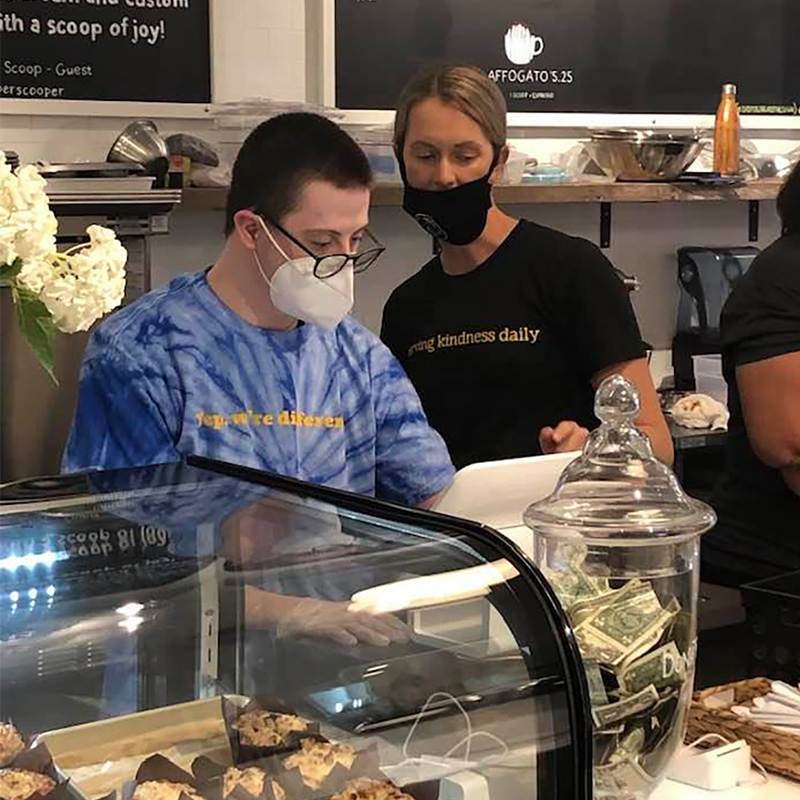Everybody can use an ice cream now and then. And everybody benefits from a welcoming workplace.
That’s the idea — with a twist — behind The Golden Scoop, a nonprofit ice cream and coffee shop at 9540 Nall Ave. in the Nall Hills Shopping Center in Overland Park.
The Golden Scoop employs people with intellectual and developmental disabilities in “an environment where our employees are mentored, inspired and equipped to succeed in their jobs and their lives,” according to the shop’s website (thegoldenscoop.org).
Sisters Amber Schreiber and Lindsay Krumbholz, along with Michelle Reeves, co-founded the shop, which they opened April 14 after about three years of preparation.
Hank Wolf started working at the shop shortly after it opened. He lives in Leawood and has Down Syndrome. He’s 20 years old and a graduate of Blue Valley North High School.
Hank attends school every weekday at Blue Valley North’s 18-to-21 program and works at The Golden Scoop after school on Wednesdays, said his father, Paul Wolf.
“I do have fun working there,” Hank said. “I love working there because I love giving back to the community, and I love ice cream.”
Paul, who is Jewish, learned of The Golden Scoop on Facebook. His wife, June Wolf, emailed the shop asking about job opportunities for Hank. They said Hank would need to send a resume and interview in person.
The Wolfs, both Kansas City-area natives, made a video resume of Hank and sent it to the shop. He interviewed a few days later. He took the interview without his parents in the room.
He was a little nervous — who isn’t during a job interview? — “but Hank’ll talk to anybody,” his father said. “He loosened up once it got started.
Hank is a workforce veteran. His first job was at a TJ Maxx store in California, hanging up clothes a couple of hours a week. When the family returned to the Kansas City area, he bagged groceries at a Price Chopper.
His job at The Golden Scoop is his first in more than a year, and he’s happy to be working again.
“He absolutely loves it,” his father said. “He looks forward to every Wednesday. Loves being around people. He’s a salesman. He gets people to try all the flavors. … He’ll come home and tell us what he did.”
Twenty-two people with disabilities work at the shop, Krumbholz said. The shop’s founders are “a godsend for all these families, not just us,” Paul said.
Having Hank work was the Wolfs’ goal since he was a child, his father said. Their thinking was “let’s get him acclimated, self-sufficient, employed and move on to adulthood a little bit.”
The Wolfs have always wanted Hank to be part of the community, June said.
“Hank is not that much different than other people,” she said. “He wants friends, to feel useful, to be proud of himself and to fill his time. This is all of those things.”
Some of the employees had trouble with their fine and gross motor skills when scooping ice cream, which slowed down the customer line, June said.
The shop’s founders brought in an occupational therapist from the University of Kansas Medical Center to work with the employees. Now the employees scoop the ice cream in advance and hand it to customers when they get to the counter.
The community’s response to The Golden Scoop “has been phenomenal,” Paul said. The shop has shut down four times because they had run out of product, June said.
Volunteer coaches work every shift, helping employees when necessary, Krumbholz said.
Most employees work three-hour shifts but some work six hours. Some bring their own job coaches. Employees work the coffee machine, baked goods, the register, scooping ice cream and handing out ice cream.
Krumbholz has worked with people with disabilities for 18 years.
She learned of an East Coast coffee shop called Bitty & Beau’s Coffee two to three years ago and another in Dallas called Howdy Homemade Ice Cream. They both employ people with disabilities and got her thinking about starting her own shop.
Paul and June encourage other parents of children with disabilities to take advantage of job opportunities when they come along because there aren’t many of them. Paul said he hoped that would change because there’s a need for it. June said parents must advocate for their children.
“These things don’t happen typically on their own,” she said. “You have to believe in your child’s abilities. The one thing we learned is that we never count Hank out, not ever. ‘Can’t’ is not in his vocabulary. Sometimes it takes Hank longer, but he’ll get there.”
An example of that is when Hank was working the cash register a couple of weeks ago.
June had come to the shop toward the end of his shift. A customer paid with cash. The register tells Hank how much change to return, but he must figure out how to choose the right bills and coins, she said.
“The value of money and being able to put together the right bills in the right amount — we’ve been working on that for 15 years,” she said. “I teared up watching him.”
All the teachers, therapists and other care professionals who have worked with Hank helped him get where he is.
“To see him do that and see people respond to him and recognize what he is capable of is everything we’ve ever hoped for,” June said. “People are so kind. Parents are afraid people are going to be mean. That has just not ever been the case.”



